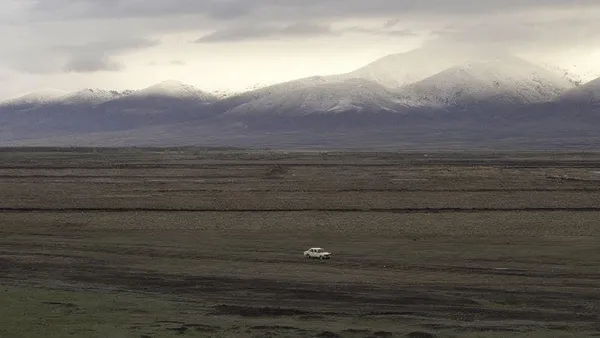Eye For Film >> Movies >> Landshaft (2023) Film Review
Landshaft
Reviewed by: Amber Wilkinson

Borderlands might appear like liminal spaces - and they’re certainly often treated as such in political tussles over ownership - but the picture is different for those who live there. This is just one of the ideas that comes across strongly in Daniel Kötter’s documentary, which sees him driving through the Nagorno-Karabakh area of eastern Armenia.
Occupied by Azerbaijan since the 44-Day War of 2020, it is home to the Sotk gold mine, a smattering of people and an awful lot of sheep. As his camera slowly pans the landscape - described as “the homeland of potatoes” by one contributor - with its mountains, farmers and their animals going about their business and acres of empty space, it seems the most unlikely place for battle. Those looking for analytical chapter and verse on the war may find this on the frustrating side, but Kötter’s approach is to offer an immersive ground-level view as he travels the area in a beaten up Zhiguli.
Along the way, in between observing the landscape - something that is likely to test the patience of some viewers and could use a tighter edit - he talks to a cross-section of the people who live there or listens in on conversations, gradually allowing a picture to emerge. In one conversation a story about a friendship between an Armenian and Azerbaijani is recounted, a situation that, like so much in the region, is ultimately upset by conflict. It brings with it a mix of emotions, from the hopefulness of humans despite governmental conflict to the melancholy realisation that war brings consequences even for those who don’t want to actively participate.
“We’re almost intertwined,” notes one resident, yet elsewhere there’s a strong fear of “the other”, with something as innocuous as a note of the wrong country’s money being found on the street sparking paranoia. Is this “healthy fear” or “pathalogical fear” - someone explains the difference. Talk of war seems faintly ridiculous given what appears to be being fought over but, at ground level, there’s a sense of threat. There’s also a heavy irony in the fact that when it comes to the subject of the mine, “Russia is running things here”.
Kötter’s film generates a sense of war not just as a destructive influence but as something that leads to both stoicism and inaction. “I’ve been fighting for 30 years,” notes one woman, and all she seems to have to show for it is the list of dead family names as a result. “They don’t do anything because the situation is uncertain,” notes someone else. That, Kötter’s documentary suggests, alongside the pain of loss, is perhaps the greatest tragedy of war.
Reviewed on: 25 Apr 2023















